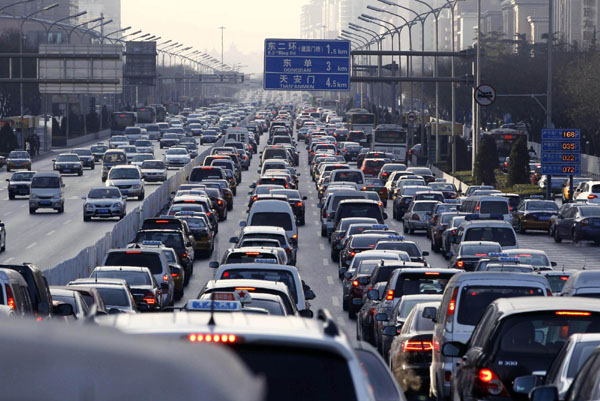Center
Tunnels, rails to ease capital's traffic woes
Updated: 2011-01-17 07:59
By Wang Wei, Wang Wen and Qin Zhongwei (China Daily)
 |
|
A conductor performs in front of the Chinese national emblem during the opening ceremony of the 13th Beijing People's Congress on Sunday. [Photo/Agencies] |
BEIJING - The capital will continue to tackle traffic congestion by building massive underground tunnels and expanding rail transit, Mayor Guo Jinlong told the city's annual legislative meeting on Sunday.
Guo said in the government's annual report that one of many important jobs in 2011 is constructing underground roads on the east and west sides of the Second Ring Road.
But the locations will make construction work challenging, policymakers believed.
"Because of the complex underground pipeline systems, geological conditions and abundance of historical relics, these will be the world's most difficult tunnels to dig," Beijing municipal commission of urban planning Vice-Director Zhou Nansen said.
The deepest section will be 60 meters underground and require sophisticated evacuation and fire-control facilities, Zhou said.
Construction will begin on another 2-km-long tunnel under Wangfujing Avenue, the city's renowned commercial pedestrian street. The deepest section of the Wangfujing tunnel will be 50 meters belowground.
Other solutions discussed during the meeting included doubling the 336-km-long subway network by 2015 and nearly tripling it by 2020.
The capital's traffic problems arising from rapid economic growth have, in turn, become an impediment to it and affect residents' daily lives.
Rainfall on Sept 17, 2010 caused an unprecedented traffic jam, clogging a record 140 of the capital's roads.
|
 |
Deputies are actively contributing proposals at the annual conference to address transportation problems.
Beijing Normal University art professor Yu Dan, who is acclaimed for lecturing on the Analects of Confucius on TV, said her discussion group members paid serious attention to the traffic problem.
Yu believed expanding public transport is the solution.
"The public transport system is still weak. That's why many of us choose private cars to meet our daily needs," she said.
Decentralizing the city's zoned functions has also been proposed, she added.
The Beijing government also outlined the 12th Five-Year Plan (2011-2015) in its annual work reports. It vowed to continue Beijing's economic development by increasing the local GDP by 8 percent annually over next five years and ensuring people's incomes keep pace with GDP growth.
E-paper

Ear We Go
China and the world set to embrace the merciful, peaceful year of rabbit
Preview of the coming issue
Carrefour finds the going tough in China
Maid to Order
Specials

Mysteries written in blood
Historical records and Caucasian features of locals suggest link with Roman Empire.

Winning Charm
Coastal Yantai banks on little things that matter to grow

New rules to hit property market
The State Council launched a new round of measures to rein in property prices.




